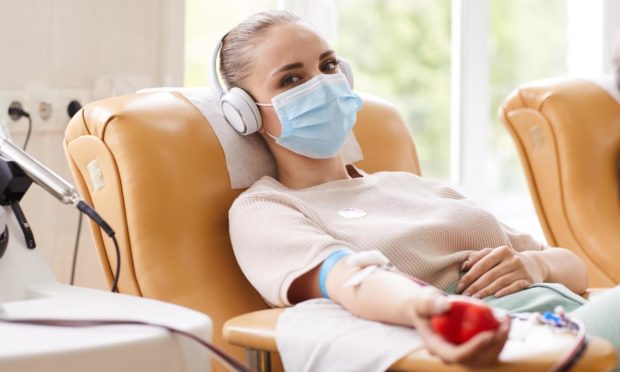Giving blood is quick and painless: an incredibly simple procedure that could save someone else’s life. But more and more people are asking: can I give blood after the covid vaccine?
Just like other services, The Scottish National Blood Transfusion Service (ScotBlood) has been hit hard by the pandemic, and is asking people in Dundee and the surrounding area to come forward and donate if they can.
With two thirds of the adult population having had their first vaccination in Scotland, we’re answering all your questions about how to give blood safely after lockdown.
Can I give blood after having the Covid vaccine?
You can donate again on the eighth day after receiving the vaccine.
According to ScotBlood, it is safe to donate blood eight days after having the Covid-19 vaccine, provided you are fully recovered from any side effects.
Lorna McLintock, consultant in donor medicine, says: “Waiting seven days is recommended to ensure donor and donation safety.
“It also reduces the risk of a donation being discarded if a vaccine recipient developed side effects around the time they donated blood.”
Can I give blood if I have had coronavirus?
You can give blood if you have had Covid-19. However, you must not donate until at least 28 days after your final symptoms have ceased.
If you have been self-isolating but were symptom-free yourself (for example, if other household members were sick or you have returned from abroad), you must not donate until 14 days after your first day of self-isolation, as long as you do not develop symptoms during that time.
Warning: The below video contains references to a traumatic birth, which could be distressing for some viewers.
Why must I be fully recovered from any vaccine side effects?
If you are unwell after getting vaccinated, it is important to wait until you feel better to donate. This is more for donor safety than for the safety of the recipient, as Lorna explains:
“If someone still has side-effect symptoms, giving blood could make them feel worse. There is also a risk that their symptoms could be due to another cause, rather the vaccine.
“The vaccines used don’t contain any live virus that could be passed on in a blood donation, so there are no concerns about someone receiving blood from a donor who has recently been vaccinated in the UK vaccination programme.”
Why should I give blood?
It may feel that the world has come to a stand-still in many ways, but for those who need to undergo operations, who are giving birth, have been in accidents and more, the need for blood transfusions has not disappeared.
That’s why it is essential that those of us who can, do continue to donate if possible.
Lorna says: “It is vital that people keep coming to give blood because patients in Scotland continue to need blood for lifesaving operations and treatments.
“We aim to have five to seven days supply of all eight blood groups at all times, and we must maintain this to support patients and hospitals across Scotland.
Unsure of face mask etiquette when you give blood? Check out the handy tips in the video below. 😷
P.s. If you're exempt from wearing a mask you can give blood. If your reason for not wearing a mask is due to a medical condition this may result in deferral under our guidelines. pic.twitter.com/vAxzCIusbM— SNBTS-Scottish National Blood Transfusion Service (@givebloodscot) April 20, 2021
“Giving blood is classed as an essential activity, because blood cannot be stockpiled, and has a shelf life of only 35 days.
“Every time you give blood you could save or improve the lives of up to three people – if you’re fit and well and aged 17 to 65, you’re actively encouraged to give blood in Scotland.
“We are always looking for new donors in Dundee, so if you haven’t given blood before, or haven’t given for a long time, we’d love to see you.”
To donate blood at the Dundee Blood Donor Centre (currently based at the Marryat Hall, City Square), make an appointment online at scotblood.co.uk, or by calling 03459090999.
